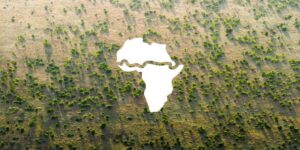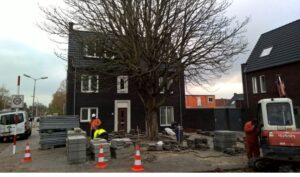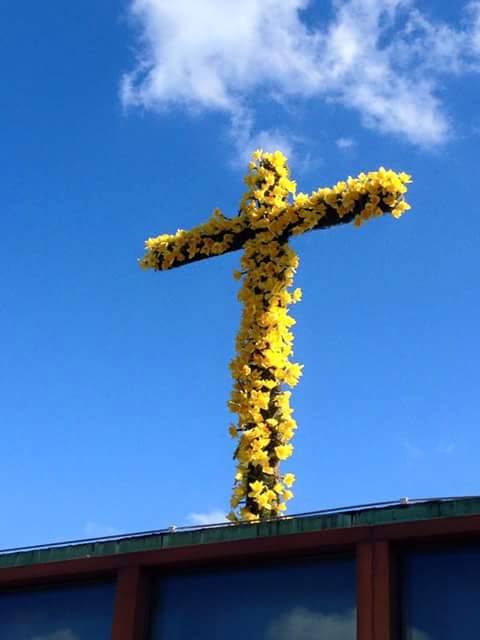bij Genesis 2:8-9;15-17, sermon in English below
Leerlingen van Jezus, gasten met ons,
We moeten het eens hebben over bomen.
Want bomen spelen een heel belangrijke rol in de schepping. Het zijn de longen van de aarde. Ze nemen CO2 op, en maken zuurstof. En bomen houden de boel bij elkaar. Ze houden water vast zodat ook andere planten kunnen groeien. Ze geven schaduw en verkoeling.
Veel milieuproblemen beginnen bij het kappen van bomen. Door het kappen van regenwoud voor onze soja en palmolie sterven dieren uit en neemt de aarde minder CO2 op. Doordat mensen de jungle binnendringen, kunnen nieuwe ziektes zoals het coronavirus van dieren op mensen overspringen.
En bomen planten is dan ook een deel van de oplossing. Om water vast te houden voor de landbouw. Om CO2 op te vangen. In Afrika is een groot project gaande om een grote groene muur aan te planten om zo woestijn, armoede, oorlog en vluchtelingenproblemen aan te pakken.

En erg fascinerend is dat bomen ook onderling kunnen communiceren. Uit onderzoek blijkt dat ze stoffen uitwisselen, elkaar kunnen waarschuwen voor gevaar, en zorgen voor hun nakomelingen. Ook bomen zijn dus een heel bijzondere verzameling atomen.

Bomen zijn tegenwoordig dan ook bijna heilig. Hier vlakbij heeft de gemeente nog een hele reddingsactie op touw gezet om de kastanjeboom van de Kastanjehof in leven te houden. Helaas zonder resultaat.

In de tijd van de Bijbel werden bomen ook als heel bijzonder gezien. Bomen waren een teken van leven. Juist ook omdat ze in het droge klimaat van het Midden-Oosten en Israël lieten zijn waar leven mogelijk was. Bomen werden vaak verbonden met goden.
En ook in Genesis spelen bomen een belangrijke rol. De levensboom staat in het centrum van het centrum. Midden in de tuin van Eden. De levensboom is de plek waar hemel en aarde elkaar raken. Waar Gods zegen de aarde raakt en vanuit de tuin in Eden verspreidt over de hele aarde.
De levensboom is geen magische boom. Met fruit met een levenselixer ofzo. Maar het is de boom van het leven dat God geeft. De boom van Gods zegen. Wie proeft van de goedheid van de Heer, wordt gezegend. Wie blijft eten van deze boom ontvangt het leven en zal niet sterven maar eeuwig leven.
Maar er is nog een bijzondere boom. De boom van kennis van goed en kwaad.
Maar wat doet die boom daar? Als je weet hoe het in hoofdstuk 3 verder gaat, dan weet je dat deze boom het begin van alle problemen wordt. Waarom zet God een boom neer in Eden waar je niet van mag eten? Als een soort test?
Ja, een soort test. Maar wel een waar het weer gaat om de betekenis. God had ook een marshmallowboom kunnen plaatsen. En kunnen zeggen dat ze daar van af moesten blijven. Dat was ook een test geweest. Een marshmallowtest.
Maar het gaat hier om een boom van kennis van goed en kwaad. Een boom met betekenis. Het gaat erom wie er mag bepalen wat goed is en wat slecht is. Wil je zelf bepalen wat goed en kwaad is? Of vertrouw je daarbij op God?
Kennis van goed en kwaad heeft in de Bijbel te maken met groeien in wijsheid. Het is kennis die nog ontbreekt bij kinderen. De jonge koning Salomo vindt dat hij nog geen kennis heeft van goed en kwaad. Daarom vraagt hij God om wijsheid als hij aan zijn koningschap begint:
1 Koningen 3
9Daarom vraag ik u dit: Leer mij om goed te luisteren. En leer mij om het verschil tussen goed en kwaad te zien. Dan kan ik uw volk leiden. Want hoe moet ik anders dit grote volk leiden?’
Iets letterlijker vertaalt vraag Salomo om een luisterend hart. Om goed en kwaad te kunnen onderscheiden. En dat is wat God hem geeft: wijsheid om goed en kwaad te onderscheiden, en recht te kunnen spreken.
De boom van kennis van goed en kwaad stelt ons voor een keuze. Gaan we af op onze eigen wijsheid. Zelf bepalen wat goed is?
Dat is wel heel populair tegenwoordig. Doen wat goed voelt. Als iets goed voelt, dan is het goed. “Volg je hart want dat klopt”.
En daar zit iets van waarheid in. God kan in ons gevoel, in ons hart werken om ons te wijzen op wat goed is. Maar ons hart heeft niet altijd gelijk. Ons hart is volgens Jezus ook een plek van duisternis. Van verkeerde verlangens. Als je die volgt, voelt dat ook goed. Maar het brengt je niet naar het goede.
God stelt ons voor de keuze om Zijn wijsheid tot ons te nemen. En dat vraagt meer van ons dan alleen je gevoel volgen. Het vraagt van ons om te groeien in wijsheid. Door God erom te vragen, zoals Salomo. Maar ook door in de Bijbel te lezen en te groeien in kennis van wat God zegt. Door elkaar te ontmoeten en van elkaar te leren. Door samen Gods stem te verstaan. En niet alleen af te gaan op onze eigen interpretatie van Gods wil. Door samen te wandelen met God.
Het is verleidelijk om de makkelijke weg te gaan. Om zelf te bepalen wat goed is. Om zonder kerk te geloven. Door je eigen hart te volgen. Maar Genesis vertelt dat het dan niet goed met de mensheid afloopt.
Vorige week vertelde ik over de zegen van Eden. Geluk en vrede die God aan ons geeft. En het ging over Koninklijk Priesterschap. Eden is een tempel waar we mogen werken. Dat is God dienen door te bidden voor de schepping en de dank van de schepping bij God te brengen. En we mogen bewaren. Als koningen Gods zegen van Eden uitdelen op de aarde.
En daar komt nu dus iets bij. Groeien in kennis van goed en kwaad. Groeien in wijsheid. In onderscheidingsvermogen van wat recht is. En dat lukt ons echt alleen samen. Als individu verval je heel snel in eigen wijsheid in plaats van Gods wijsheid.
En het lukt ons alleen als we staan op de schouders van degenen die ons zijn voorgegaan in de kerk. Al duizenden jaren zoeken gelovigen naar wijsheid. We hoeven het wiel niet opnieuw uit te vinden. Maar elke generatie moet ook zelf ontdekken welke overgedragen wijsheid echt klopt, of toch meer eigen wijsheid is geweest van die tijd en cultuur.
Het verhaal van Eden is ook een verhaal over wat wij zijn als kerk. De kerk is als het goed is een voorproefje van Gods Koninkrijk, een plek en gemeenschap waar hemel en aarde elkaar raken. Een proeftuin zoals Eden dat was. Een tempelplek.
In de kerk leven we van de levensboom. Het kruis van Jezus. Jezus heeft het kruis op zich genomen, is aan het kruis gehangen en gestorven om de levenslijn met God te herstellen. Wie proeft van zijn goedheid, van zijn genade, heeft het eeuwige leven. De band met God is herstelt.
En vanuit dat kruis, stroomt het leven. Gods zegen stroomt de kerk uit. Omdat wij hier worden gevoed. Omdat wij zelf steeds meer tempels worden, samen en als individu. Een plek waar God woont en mensen dat kunnen proeven.
En als kerk hebben we daarbij heel veel aan het ambt. Ambtsdragers zijn gemeenteleden die ons voorgaan in het samen zoeken naar Gods wijsheid. Die voorgaan in het werken en waken in de tuin van de kerk. Die irrigatiekanaaltjes graven, zoals gemeentegroeigroepen, zodat Gods zegen los kan komen. Die mest verspreiden, zoals diaconale acties, zodat er vruchtbare grond ontstaat. Die activiteiten planten en wegsnoeien, zodat er meer groei komt en minder organisatie ballast. Die samen keuzes maken in wat goed is. Waar we als kerk voor moeten gaan.
En dat voorgaan, dat geestelijk leiding geven, werkt alleen als we allemaal meewerken. Door onze geestelijk leiders te respecteren. Voor ambtsdragers te bidden. En alleen goede woorden over hen te spreken.
En door mee te bouwen.
Efeziërs 4:16
Ieder deel draagt naar vermogen bij tot de groei van het lichaam, dat zo zichzelf opbouwt door de liefde.
We zijn allemaal geroepen tot een koninklijk priesterschap. We zijn allemaal groepen om in Eden te werken en te bewaren. We zijn allemaal geroepen om ons talent in te zetten voor de opbouw van het lichaam.
Zo kunnen we samen groeien in kennis van goed en kwaad. Niet de makkelijke weg, de weg van eigen wijsheid. Maar de moeilijke weg. De weg van de liefde. Die Christus zelf ons is voorgegaan. Amen.
at Genesis 2:8-9;15-17
Disciples of Jesus, guests with us,
We need to talk about trees.
Because trees play a very important role in creation. They are the lungs of the earth. They absorb CO2 and make oxygen. And trees hold it all together. They retain water so other plants can grow as well. They provide shade and coolness.
Many environmental problems start with the felling of trees. By cutting down rainforest for our soy and palm oil, animals die and the earth absorbs less CO2. As humans invade the jungle, new diseases such as the coronavirus can jump from animals to humans.
And planting trees is part of the solution. To retain water for agriculture. To capture CO2. A major project is underway in Africa to plant a large green wall to tackle desert, poverty, war and refugee problems.
And very fascinating is that trees can also communicate with each other. Research shows that they exchange substances, can warn each other of danger, and take care of their offspring. Trees are also a very special collection of atoms.
Trees are almost sacred these days. Nearby, the municipality has launched a whole rescue operation to keep the chestnut tree of the Kastanjehof alive. Unfortunately without result.
In the time of the Bible, trees were also seen as very special. Trees were a sign of life. Precisely also because they showed where life was possible in the dry climate of the Middle East and Israel. Trees were often associated with gods.
And trees also play an important role in Genesis. The tree of life is in the center of the center. In the middle of the Garden of Eden. The tree of life is the place where heaven and earth meet. Where God’s blessing touches the earth and spreads from the garden in Eden all over the earth.
The Tree of Life is not a magical tree. With fruit with an elixir of life or something. But it is the tree of life that God gives. The tree of God’s blessing. Whoever tastes of the goodness of the Lord is blessed. Whoever continues to eat from this tree will receive life and will not die but have eternal life.
But there is another special tree. The tree of knowledge of good and evil.
But what is that tree doing there? If you know how it goes in Chapter 3, then you know that this tree is going to be the start of all problems. Why does God put a tree in Eden that you are not allowed to eat? As some sort of test?
Yes, a kind of test. But one where it’s all about meaning. God could also have put in a marshmallow tree. And can say that they should stay away from that. That had also been a test. A marshmallow test.
But this is a tree of the knowledge of good and evil. A tree with meaning. It’s about who gets to decide what’s good and what’s bad. Do you want to determine for yourself what is good and evil? Or do you trust God?
Knowledge of good and evil in the Bible has to do with growing in wisdom. It is knowledge that is still lacking in children. Young King Solomon thinks he has no knowledge of good and evil yet. That is why he asks God for wisdom when he begins his kingship:
1 Kings 3
9Therefore I ask you this: Teach me to listen well. And teach me to see the difference between right and wrong. Then I can lead your people. For how else am I to lead this great nation?”
A little more literally translates Solomon’s request for a listening heart. To be able to distinguish good from evil. And that is what God gives him: wisdom to discern good from evil, and to be able to judge.
The tree of the knowledge of good and evil presents us with a choice. We rely on our own wisdom. Decide for yourself what is good?
That is very popular nowadays. Do what feels right. If something feels good, then it is good. “Follow your heart because it’s right”.
And there is some truth in that. God can work in our feelings, in our hearts to point out to us what is good. But our hearts are not always right. According to Jesus, our heart is also a place of darkness. Of wrong desires. If you follow that, it feels good too. But it doesn’t get you right.
God presents us with the choice to take His wisdom. And that requires more from us than just following your gut feeling. It requires us to grow in wisdom. By asking God for it, like Solomon. But also by reading the Bible and growing in knowledge of what God says. By meeting and learning from each other. By understanding God’s voice together. And not just relying on our own interpretation of God’s will. By walking together with God.
It’s tempting to go the easy way. To decide for yourself what is good. To believe without church. By following your own heart. But Genesis says that it will not end well for mankind.
Last week I talked about the blessing of Eden. Happiness and peace that God gives to us. And it was about Royal Priesthood. Eden is a temple where we can work. That is serving God by praying for creation and bringing the thanks of creation to God. And we can keep. As kings distribute God’s blessing of Eden on the earth.
And now something is added. Growing in knowledge of good and evil. Growing in wisdom. In discernment of what is right. And we can only do that together. As an individual you very quickly fall into your own wisdom instead of God’s wisdom.
And we can only do it if we stand on the shoulders of those who have gone before us in the Church. For thousands of years, believers have searched for wisdom. We don’t have to reinvent the wheel. But each generation also has to discover for itself which wisdom transmitted is really correct, or has been more of its own wisdom of that time and culture.
The story of Eden is also a story about what we are as a church. The church should be a foretaste of God’s Kingdom, a place and community where heaven and earth meet. A testing ground like Eden was. A temple site.
In the church we live on the tree of life. The cross of Jesus. Jesus took up the cross, was hung on the cross and died to restore the line of life with God. Whoever tastes of his goodness, of his grace, has eternal life. The relationship with God has been restored.
And from that cross, life flows. God’s blessing flows out of the church. Because we are fed here. Because we ourselves are becoming more and more temples, together and as individuals. A place where God lives and people can taste that.
And as a church we have a lot to do with the ministry. Officials are members of the congregation who lead us in the search together for God’s wisdom. Who lead the work and watch in the garden of the church. Digging those irrigation canals, like congregation growth groups, so that God’s blessing can be released. Spread that manure, like diaconal actions, so that fertile ground is created. Plant and prune those activities, so that there is more growth and less organizational burden. Who make choices together in what is right. What we should strive for as a church.
And that leading the way, that spiritual leadership, only works if we all cooperate. By respecting our spiritual leaders. To pray for office holders. And only good words to speak of them.
And by building.
Ephesians 4:16
Each part contributes according to its capacity to the growth of the body, which thus builds itself up through love.
We are all called to a royal priesthood. We are all groups to work and keep in Eden. We are all called to use our talents to build the body.
In this way we can grow together in knowledge of good and evil. Not the easy way, the way of your own wisdom. But the hard way. The way of love. Who Christ Himself has gone before us. Amen.
